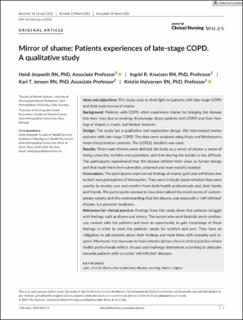| dc.contributor.author | Jerpseth, Heidi | |
| dc.contributor.author | Knutsen, Ingrid Ruud | |
| dc.contributor.author | Jensen, Kari Toverud | |
| dc.contributor.author | Halvorsen, Kristin | |
| dc.coverage.spatial | Norway, Oslo | en_US |
| dc.date.accessioned | 2021-09-29T12:59:44Z | |
| dc.date.available | 2021-09-29T12:59:44Z | |
| dc.date.created | 2021-08-06T16:02:32Z | |
| dc.date.issued | 2021-05-01 | |
| dc.identifier.citation | Journal of Clinical Nursing (JCN). 2021, . | en_US |
| dc.identifier.issn | 0962-1067 | |
| dc.identifier.issn | 1365-2702 | |
| dc.identifier.uri | https://hdl.handle.net/11250/2786062 | |
| dc.description.abstract | Aims and objectives: This study aims to shed light on patients with late-stage COPD and their experiences of shame. Background: Patients with COPD often experience shame for bringing the disease into their lives due to smoking. Knowledge about patients with COPD and their feelings of shame is crucial, but limited, however. Design: The study has a qualitative and explorative design. We interviewed twelve patients with late-stage COPD. The data were analysed using Kvale and Brinkmann's three interpretative contexts. The COREQ checklist was used. Results: Three main themes were defined; the body as a mirror of shame; a sense of being unworthy, invisible and powerless; and that sharing the burden is too difficult. The participants experienced that the disease defined their value as human beings and that made them feel vulnerable, ashamed and more socially isolated. Conclusions: The participants experienced feelings of shame, guilt and self-blame due to their own perceptions of themselves. They were in doubt about whether they were worthy to receive care and comfort from both health professionals and, their family and friends. The participants seemed to have internalised the moral norms of contemporary society and the understanding that the disease, and especially a ‘self-inflicted’ disease, is a personal weakness. Relevance for clinical practice: Findings from this study show that patients struggle with feelings such as shame and misery. The nurses who work bedside are in continu ous contact with the patients and have an opportunity to gain knowledge of these feelings in order to meet the patients’ needs for comfort and care. They have an obligation to ask patients about their feelings and meet them with empathy and respect. Moreover, it is necessary to have interdisciplinary fora in clinical practice where health professionals reflect, discuss and challenge themselves according to attitudes towards patients with so-called ‘self-inflicted’ diseases. | en_US |
| dc.language.iso | eng | en_US |
| dc.publisher | Wiley | en_US |
| dc.relation.ispartofseries | Journal of Clinical Nursing (JCN);Volume 30, Issue 19-20, October 2021 | |
| dc.rights | Attribution-NonCommercial-NoDerivatives 4.0 Internasjonal | * |
| dc.rights.uri | http://creativecommons.org/licenses/by-nc-nd/4.0/deed.no | * |
| dc.subject | Care | en_US |
| dc.subject | Chronic obstructive pulmonary diseases | en_US |
| dc.subject | Nursing | en_US |
| dc.subject | Shame | en_US |
| dc.subject | Stigmas | en_US |
| dc.title | Mirror of shame: patients experiences of late stage COPD. A qualitative study | en_US |
| dc.type | Peer reviewed | en_US |
| dc.type | Journal article | en_US |
| dc.description.version | publishedVersion | en_US |
| dc.rights.holder | © 2021 The Authors | en_US |
| cristin.ispublished | true | |
| cristin.fulltext | original | |
| cristin.qualitycode | 2 | |
| dc.identifier.doi | https://doi.org/10.1111/jocn.15792 | |
| dc.identifier.cristin | 1924462 | |
| dc.source.journal | Journal of Clinical Nursing (JCN) | en_US |
| dc.source.volume | 30 | en_US |
| dc.source.issue | 19-20 | en_US |
| dc.source.pagenumber | 2854-2862 | en_US |

